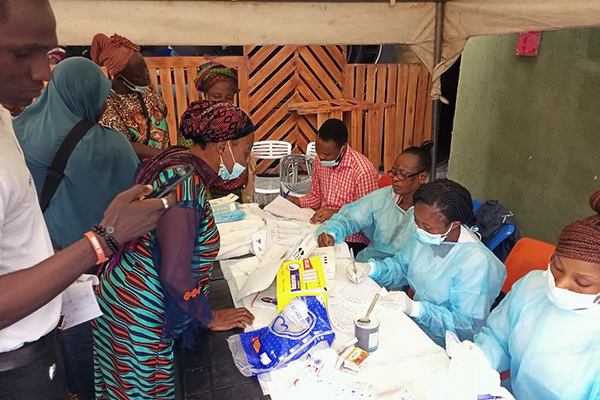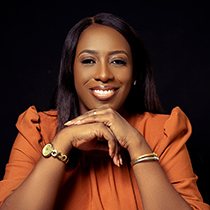

The pandemic did not just slow down the delivery of essential health services to vulnerable populations. In many cases, it completely cut it off. On 23-24 June, health days were organized at 60 sites in Nigeria. At two sites at Ikeja, Dr. Omolola Salako, a clinical oncologist, and her team witnessed hundreds of women queueing up to get their cervical cancer screening and tests done. Salako is founder of three organizations – Sebeccly Cancer Care and Support Centre, Oncopadi Technologies and Pearl Oncology Clinic, and has spent over 16 years providing quality care and education to cancer patients in Nigeria. She recently shared her experience with Sneha Saloni, a communications specialist with the Rotary Action Group for Family Health & AIDS prevention.
“Being at the Rotary Family Health Days was a wonderful experience. I have always known about Rotary. In 2020, soon after the lockdown, we worked together on a prostate cancer screening program. This year, we partnered with Rotary at the two sites in Ikeja and set up our mobile screening units.
When you look at the cancer statistics, most of the cancer types affect predominantly women. Each time a woman visits me accompanied with her little kid, for cancer treatment, it shakes me up. Most of the time, these women do not have strong family support. There is so much we can do to help them.
Finding Purpose in Pain
I lost my sister to cancer 19 years ago, and this is where it all started from for me. I found a purpose in my pain. When I do my work, I remember the incredibly difficult time my family had to go through. So, I am trying to do my best to help reduce the pain of others.
Each time I treat someone, I feel so happy seeing them win the cancer battle. To know and let them know that they are not alone in this and when my patients come back just for a follow up after being treated, I just feel so humbled. There is a lot of fulfilment in this.
While there is a visible lack of awareness, in many cases the treatment process is further delayed by the time it takes for cases to be detected and arrangements made to cover the treatment costs. Flying out to a different country is not an option that many can afford. The treatment journey is also not easy.
RFHDs and Their Community Reach
The reach at these programs is brilliant. Two hours into the program, women started showing up. Serving each community is such a different experience as they all respond very differently on how they wish to utilize the health services. We have a lot of experience with community mobilization and we understand that it is very important to educate women on the benefits of cancer screening, help them understand the procedure. It is critical that their queries are answered so that they feel more settled and understand the benefits of screening, testing and cure.
A lot of women who visited us were very appreciative and looked forward to getting screened and educated. The best part of seeing these women at the health day sites was that they did not have to worry about the costs. Everything was taken care by RFHA and its partners. Moreover, the sites were set up just at a walking distance from their communities so that they did not even have to bear any transportation costs.”
Dr Salako’s team also helped these women get registered so that they can follow up with them in future. Around 400 women were screened over two days during the program.
“I just know that we can help more women prevent cervical cancer. We can detect breast cancers early. Cancer-induced deaths in Nigeria and even globally, can be reduced. Girls should get vaccinated and we can have a generation free from cervical cancer. A generation where women spend their lives living happily and healthily with their families, and not worrying about visiting hospitals fighting cancer.
What More Can We Do?
In 2020, 15,000 Nigerian women were diagnosed with cervical cancer. And we know that it is still not the right figure as not many women come to the hospital to get checked. Providing women with accurate information and reporting is what these community cancer clinics will help in doing.
We must invest more in cancer prevention at a community level and pull resources to focus more on community screening. Let us ensure that we have set up a structure that can screen and treat cancer at the early stages and help prevent it. So, setting up community cancer clinics would be a great way to achieve early cancer detection and prevention.
The fragile healthcare system and lack of access to quality healthcare is a pressing issue in Nigeria. Women and girls are disproportionately affected. 40 percent of cancers are preventable. Sustained awareness programs and community screenings are the key steps to follow to achieve this result.”
RFHA’s goal is to reinstate the Rotary Family Health Days that were put on hold due to the pandemic and to take free critical care to communities that need them most. To help and learn more, visit https://www.rfha.org/get-involved
https://blog.rotary.org/2022/09/07/i-found-a-purpose-in-my-pain-nigerian-oncologist-changes-lives/

